Scientist diaspora want friendlier policies
When Dwi Hartanto was invited to attend the Visiting World Class Professors program — organized by the Research, Technology and Higher Education Ministry — last year, many were genuinely inspired by the young man
Change Size

W
hen Dwi Hartanto was invited to attend the Visiting World Class Professors program — organized by the Research, Technology and Higher Education Ministry — last year, many were genuinely inspired by the young man.
At the time, Dwi, who reportedly claimed to be an assistant professor at TU Delft in the Netherlands, apparently hoped to pursue scientific collaborations with his domestic peers.
Roughly a year later, it was revealed that many of his claims were false and the 35-year-old scientist made headlines again, but for all the wrong reasons.
The public was appalled by his dishonesty, but the question that was raised in the wake of the scandal was: How could the government fail to verify Dwi’s claims?
For Indonesia’s scientific diaspora, the answer may lie in the fact the government has done little to embrace them and help them contribute to their nation.
Hanindyo Kuncarayakti, a post-doctoral fellow at the Finnish Centre for Astronomy with ESO (FINCA), University of Turku, Finland, said the government should do more to encourage Indonesian scientists to contribute to the scientific development of their home country.
“At some of the Indonesian embassies in the countries I have lived, I have been invited to give talks to disseminate my scientific knowledge — but this was because some of the embassy personnel knew me personally and not because there was a specific government program,” Hanindyo told The Jakarta Post via email recently.
The 34-year-old astronomer, whose career has taken him from Indonesia to Japan, Chile and Finland, said he had heard of an incident in which a diaspora researcher ended up stranded during winter because the embassy, which had invited him for a lecture in another town, canceled the event without prior notice and did not provide resources to cover accommodation or transport.
Many in the scientific diaspora believe the government’s policies are unfriendly to them, such as the requirement to be present in Indonesia when applying for civil servant positions.
The policy means these scientists have to undergo significant personal expense to apply for such positions, even though, in many cases, their applications are rejected anyway.
“Many countries actually have programs in place to encourage their diaspora to return, such as by offering them permanent positions, relocation allowances and research grants. Indonesia is definitely not doing that at the moment,” Hanindyo said.
“I think in principle the scientific diaspora could be very useful and important for gaining knowledge, access to facilities, networks and funding opportunities […],” he added.
The government is aware of the value of Indonesia’s scientific diaspora.
In an attempt to encourage members of the scientific diaspora to boost their contributions to Indonesia’s scientific development, the Research, Technology and Higher Education Ministry is slated to hold a world-class intellectuals symposium from Dec. 17 to 22, which is set to connect diaspora scientists and intellectuals with their domestic peers to enhance collaborations.
The symposium, held in collaboration with the Indonesian Youth Science Academy (ALMI), is a follow up to this year’s Visiting World Class Professor program, in which some 84 world-class professors collaborated with a number of universities to improve the performance and productivity of the country’s scientific research.
As part of the event, participants of the symposium were also scheduled to visit universities to develop collaboration plans, including ideas for joint research, publications and technology development, the ministry’s director general for technology and higher education resources Ali Ghufron Mukti said.
“[Members of the scientific diaspora] are expected to share their experiences, competencies, resources and professional connections with scientists, lecturers and researchers [working] in Indonesia,” Ghufron told the Post recently.
Rino Rakhmata Mukti, an assistant professor at the Bandung Institute of Technology’s (ITB) department of chemistry and ALMI representative set to attend the symposium said it was hoped that the interactions between scientists at the event would generate new strategies on science and education development in Indonesia.
According to the requirements set by the ministry, applicants must be at least an assistant professor or of a similar position. Post-doctoral scientists are therefore not eligible to take part, according to information on the ministry’s website.
Those with existing cooperation partnerships with universities or research institutes in Indonesia will be given priority.
Bramasta Nugraha, a post-doctoral scientist at the University of Zurich’s Institute for Regenerative Medicine (IREM) and the department of surgical research at University Hospital Zurich, was dismayed by the requirement.
Bramasta, who studies stem cells, said he would be very keen to join the program to enhance his networks with scientists in Indonesia, particularly those who worked in a similar field, so that he could pursue research collaborations.
“Every year, the Swiss Embassy in Jakarta sends me research funding offers to be forwarded to Indonesian scientists, but because I have no channels, I don’t know who to forward the offers to,” the 32-year-old scientist said.
Since completing his bachelor’s degree at Nanyang Technological University in Singapore in 2003, Bramasta has lived abroad. Participating in such programs would give him a chance to connect with prominent scientists and research institutions, Bramasta said.
“By taking part in these programs, we can share our knowledge about scientific progress made in foreign countries, which could be taken up in Indonesia,” he said, adding that it was quite difficult for scientists in certain fields to attain the position of assistant professor as it could be extremely competitive and require significant time and research.









